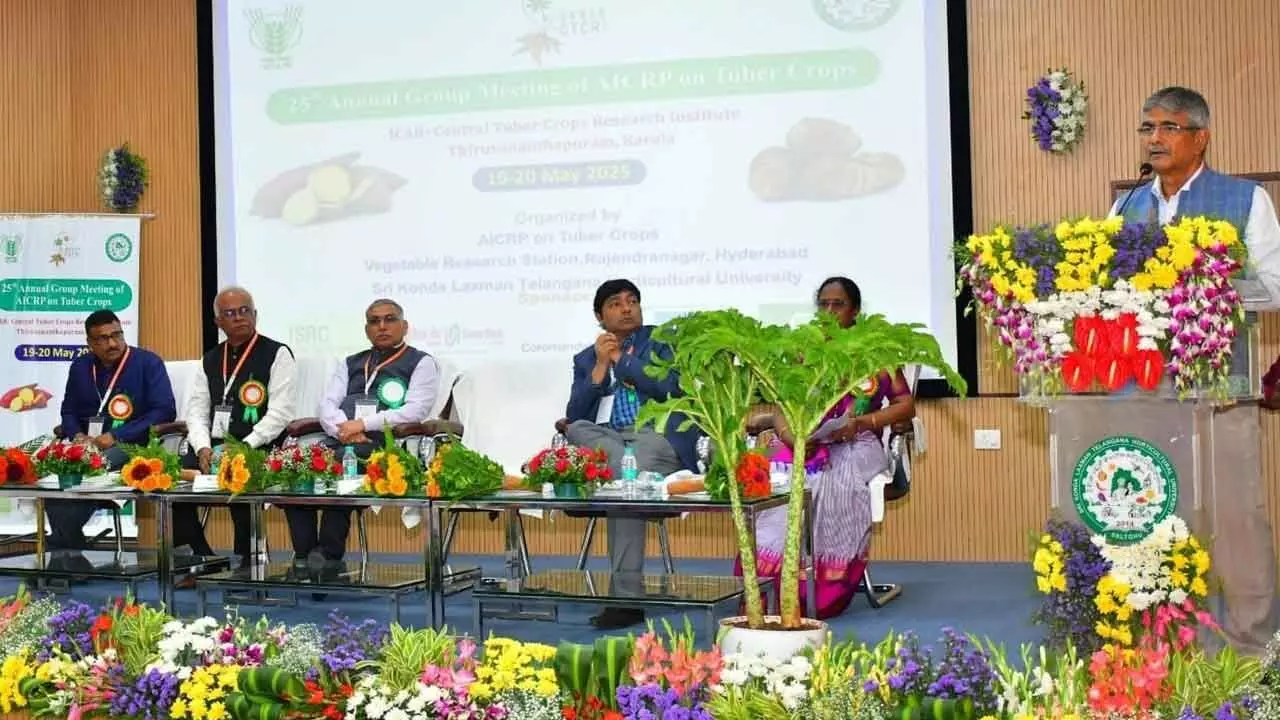Hyderabad – At a major event in Rajendranagar, experts stressed the growing importance of tuber crops in India’s food and farming sectors.
Dr. Danda Raji Reddy, Vice Chancellor of Telangana Horticultural University, led the discussion during the 25th Annual Group Meeting of the All-India Coordinated Research Project on Tuber Crops, held at the College of Horticulture. The event was jointly organized by the Central Tuber Crops Research Institute (CTCRI), Kerala, and the Vegetable Research Station, Telangana.
Dr. Reddy highlighted that tuber crops play a key role in boosting nutritional security, offering job opportunities, and opening doors for exports. These crops can grow in different settings, including home gardens, and adapt well to climate changes.
He emphasized the need to create short-duration varieties and connect farmers with Farmer Producer Organisations (FPOs). Encouraging cultivation within 50 km of towns could make tuber vegetables more accessible to consumers.
Dr. Reddy also said that setting up large-scale processing industries and spreading modern farming technology would transform tuber crop farming across the country.
According to recent data, farmers growing horticultural crops earn between ₹13,000 to ₹14,000 per month, while those cultivating other crops earn only ₹3,000 to ₹4,000. This shows the higher profit potential in horticulture.
Dr. Sanjay Kumar Singh, Deputy Director General at ICAR, urged scientists to create bio-fortified varieties rich in nutrients. He encouraged farmers to cut down on chemical fertilizers and instead use organic inputs and natural plant-based treatments for better profits and health.
India still lags in tuber crop productivity compared to many other countries. Dr. Singh called for stronger research efforts to improve yields and efficiency.
Dr. Sudhakar Pandey, ICAR Assistant Director General, shared that tuber crops rank third globally, after rice and pulses, and make up about 4.6 to 5% of all vegetables worldwide. He said over 155 varieties have been developed so far, and research continues on virus-resistant and high-density planting methods.
Dr. G Baiju, Director of CTCRI, believes tuber crops are a smart choice for the future. He said developing high-yield, short-term, and water-saving varieties tailored to local weather could expand their cultivation. He noted that tubers offer a more balanced diet than grains like cereals and millets.
Dr. Sheikh N Meera, Director of Zone 10 at ICAR-ATARI, pointed out that tuber crops have been overlooked for decades due to the focus on rice and wheat. However, they are nutrient-rich and can thrive in changing climate conditions.
He suggested forming smart crop clusters, improving storage facilities, branding tuber crops, and supporting self-help groups to boost marketing and sales.
In recognition of excellence, BSKKV Dapoli (Maharashtra) won the award for Best AICRP Tuber Crop Centre 2024-25. For highest revenue generation, the University of Agricultural Sciences, Dharwad secured first place, followed by Dapoli in second, and Navsari Agricultural University, Gujarat, in third.
With growing support from scientists and policymakers, tuber crops could soon become a key part of India’s agricultural future.











